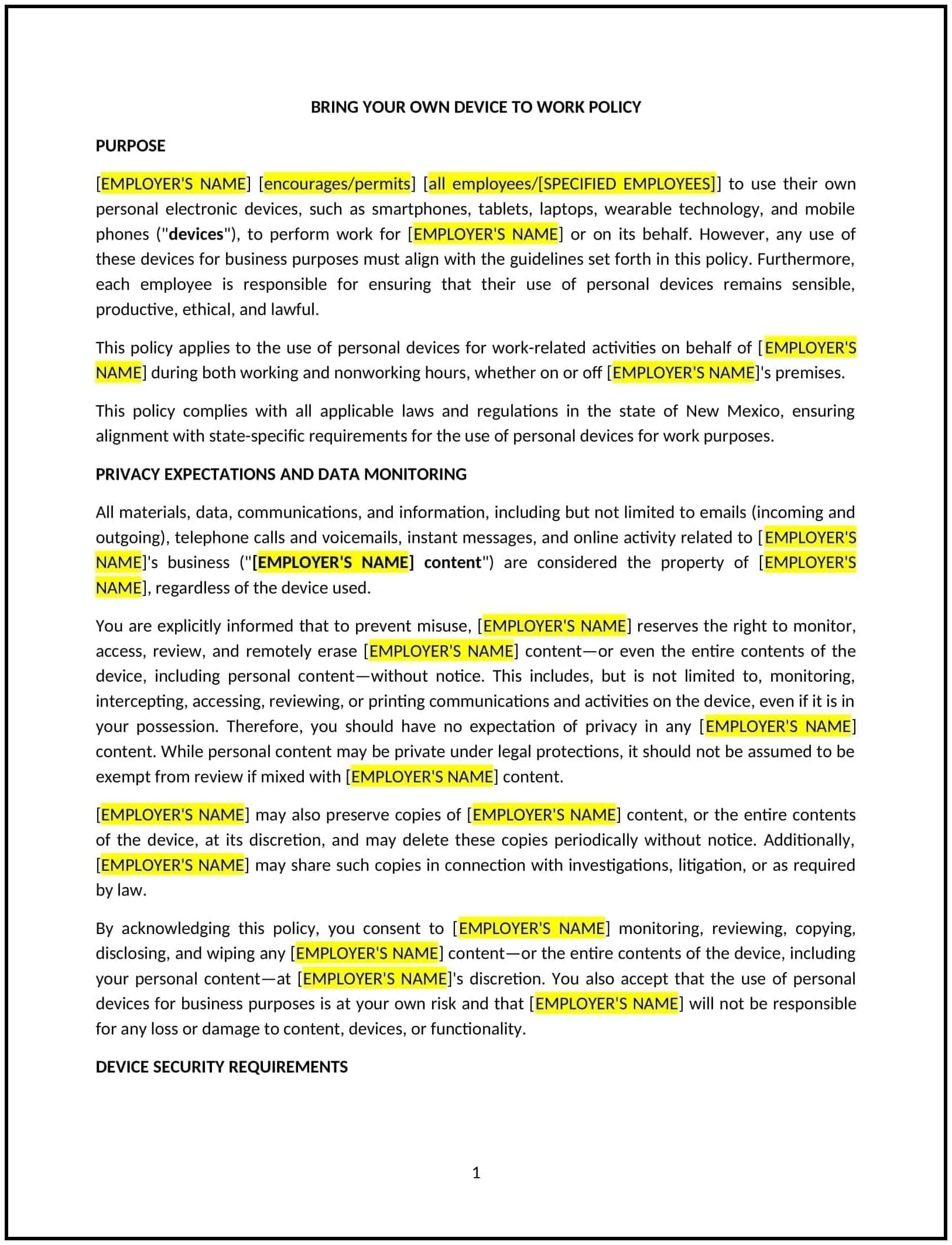Bring your own device to work policy (New Mexico): Free template
Got contracts to review? While you're here for policies, let Cobrief make contract review effortless—start your free review now.

Customize this template for free
Bring your own device to work policy (New Mexico)
This bring your own device (BYOD) policy is designed to help New Mexico businesses manage the use of personal devices in the workplace. It sets clear guidelines for employees who wish to use their personal devices (e.g., smartphones, tablets, laptops) for work purposes while maintaining security, privacy, and efficiency.
By adopting this policy, New Mexico businesses can improve flexibility and productivity, while minimizing potential security risks and ensuring that the workplace technology infrastructure remains secure.
How to use this bring your own device to work policy (New Mexico)
- Define eligible devices: Clearly specify which types of personal devices employees are allowed to use for work-related tasks, including smartphones, laptops, and tablets. Outline any restrictions based on job functions or security concerns.
- Set security requirements: Establish security protocols for devices used in the workplace, such as password protection, encryption, anti-virus software, and remote wiping capabilities in case of loss or theft.
- Clarify acceptable use: Outline acceptable use policies, including what types of applications, services, and websites are permitted or prohibited on personal devices while used for work purposes.
- Address data privacy: Define how personal and company data will be handled on personal devices, ensuring that sensitive company information is protected and employees’ personal information is respected.
- Set expectations for support: Specify the level of support the business will provide for personal devices, including troubleshooting, software updates, and technical assistance.
- Establish the process for enrolling devices: Set up a process for employees to enroll their devices in the company's network, including necessary security measures and device registration.
- Reflect New Mexico-specific considerations: Ensure that the policy accounts for any local privacy laws or state-specific data protection regulations that may apply in New Mexico.
Benefits of using this bring your own device to work policy (New Mexico)
Implementing this policy provides New Mexico businesses with several advantages:
- Increases productivity: By allowing employees to use their personal devices, businesses can provide employees with more flexibility and improve work efficiency, particularly in a mobile or remote work environment.
- Reduces hardware costs: Businesses can reduce costs by not needing to provide devices for every employee, while allowing employees to use their own devices for work-related tasks.
- Enhances employee satisfaction: Offering the option to use personal devices can lead to greater employee satisfaction, as many employees prefer the comfort and familiarity of their own devices.
- Strengthens data security: By setting clear security protocols for personal devices, businesses can safeguard sensitive information, reducing the risk of data breaches or unauthorized access.
- Supports New Mexico laws: Ensures the policy adheres to any state-specific regulations regarding data privacy and employee rights, providing legal protection for both the business and employees.
Tips for using this bring your own device to work policy (New Mexico)
- Communicate the policy clearly: Ensure that all employees are aware of the BYOD policy, including how to properly register and secure their personal devices for use at work.
- Implement strong security protocols: Work with IT to establish and enforce strong security measures, including multi-factor authentication, encryption, and secure Wi-Fi usage, to protect business and employee data.
- Provide training: Offer training to employees on security best practices for using personal devices at work, including safe browsing, email handling, and protecting sensitive information.
- Set clear expectations for work-life balance: Make sure employees understand the distinction between personal and work-related use of their devices to avoid overuse or misuse of company time and resources.
- Regularly review the policy: Periodically review and update the policy to address emerging technology trends, new security threats, or changes in New Mexico state laws that affect data protection and privacy.